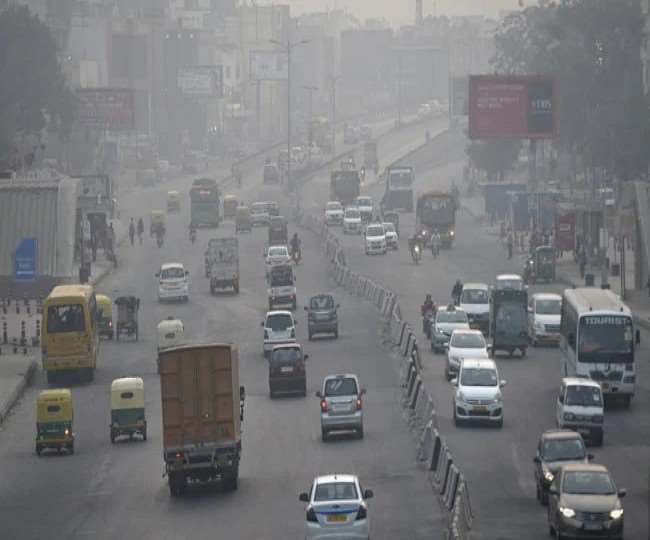Lucknow, November 08: For the past one week, the air quality index ie Air Quality Index (AQI) of Lucknow, the capital of Uttar Pradesh, has been in the range of 400 to 500.
In the corona period, there are many problems including eye irritation, watery eyes, and difficulty in breathing.
However, these days the word smog is also very much discussed. Smog is made up of two words. It means a mixture of smoke, ‘smoke and fog’. Due to increase in the amount of poisonous gases in the air, people are suffering from breathing problems as well as eye irritation.
Environmentalist and science communicator Sushil Dwivedi spoke about important reasons for the changing weather, its impact and solution.
He said that these problems are common due to increasing pollution these days. This happens when the AQI rises dangerously. If the air quality index is between 0-50, it is considered good, it is satisfactory between 51-100, averages between 101-200, bad between 201-300 and between 301-400 very bad and if it is between 401 and 500 then it is considered serious.
According to Sushil Dwivedi, in the last five days in Lucknow, PM 2.5 has been recorded above its highest level of 400. PM 2.5 is the finer particles floating in the air that we cannot see, but with breathing they enter our body. The lower their volume in the atmosphere, the cleaner the air is. It’s safe level in air is 60 micrograms. Apart from this, PM10 also affects the air quality. These tiny particles do not stop from our nose hairs and reach the lungs and spoil them.
According to Dwivedi, every person living in Lucknow, even if he is a newborn baby, is taking 10 to 15 cigarettes of toxic smoke daily to his lungs due to pollution. In the presentation of the Ministry of Health recently, it has also been told that the average age of people in India has decreased by 1.7 years due to pollution. Along with this, one thing came to light that India has 21 cities among the 30 most polluted cities in the world.
It is worth noting that the Parliamentary Committee was informed by the Ministry of Health that 12.5 per cent of the deaths in India are due to pollution and related diseases.
Similarly, if the research of Chicago University of America is to be believed, then the age of the people of North India is reduced by 5 to 7 years from the people living in other clear air places due to pollution.
Indoor pollution a silent threat
Due to excess pollution outside, the level of indoor pollution in the house is also increasing rapidly. We have forgotten about the smell of open air locked in rooms with air conditioners. This closed air is harmful to our health, which can cause trouble breathing, allergies, headache, fatigue and other diseases, in addition to this there are things in our daily living.
Toxins and gases release slowly in the air of homes. Formaldehyde, carbon dioxide, carbon monoxide, benzene, nitrogen oxides are poisonous gases that are harmful to health. Plastic and chemical paints, plastic items, mosquito cockroach sprays, varnishes, new carpets, chemical air fresheners, etc. are poisoning our homes.
Measures to avoid indoor pollution
The way to avoid it is to have constant air circulation in the houses. Apart from this, there is also a solution that we should put such air purifying plants in the pot which absorb poisonous gases. These indoor plants make vital oxygen gas and can purify the house air.
However, these are 21 such plants that are easily found in any nursery and which are full of these characteristics. Date Palm or Beetle Palm, Aloe vera, Ghrit-Kumari or Guarpatha, Rubber Plant, Snake Plant, Spider Plant, Lady Palm, Peace Lily, Money Plant, Gerbera, English Ivy, Bamboo Palm, Boston Fern, Neem Plant, Basil Plant , Banana Plant, Weeping Fig, Dracaena Plants, Heart Leaf Philodendron, Chinese Evergreen, Christmas Cactus, Orchid.
Some other measures that can also be adopted during indoor pollution
Try to avoid smoke and dust.
Always keep Asthma patients with nebulizer and inhaler.
Wear a mask. This will save you from the trouble of dust.
You can also use handkerchief soaked with water.
If the eyes and nose are red, wash it with cold water.
Wash the lip when it is jealous.
Some tips will provide relief from outdoor pollution
Avoid morning walks and evening outings.
Avoid heavy exertion for a long time.
Walk a short distance instead of a long walk. Take several breaks in the meantime.
In case of any problem related to breath, stop physical activity.
Close the windows of the house if you feel excessive pollution.
Avoid burning wood, candles and incense sticks.
Wipe the room with water to reduce dust and particles.
Use masks when out.





